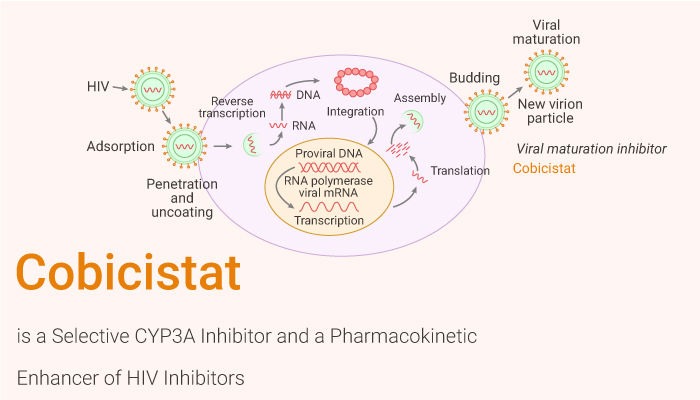The highly active antiretroviral therapy (HAART) can transform the human immunodeficiency virus (HIV) infection into a manageable chronic disease in a little over a decade. The combination of antiretroviral drugs inhibiting different stages of the HIV life cycle is coming to durable and full viral suppression. Additionally, it results in an increase in CD4 T cell counts, thereby delaying disease progression and reducing the mortality rate.
Ritonavir is an inhibitor of HIV protease used to treat HIV infection and AIDS. Additionally, acts as an HIV PI, it can be metabolized rapidly primarily by cytochrome P-450 enzymes of the 3A subfamily (CYP3A) in the liver and intestine. This usually results in low systemic exposure and short half-lives.
In this article, we will introduce a selective CYP3A inhibitor and a pharmacokinetic enhancer of HIV inhibitors, Cobicistat.

Firstly, in HIV-1 protease enzymatic assay and antiviral cellular assays. Cobicistat is inactive against HIV-1 protease (IC50>30 μM). And it has no inhibitory effect against HIV replication in a multicycle 5-day MT-2 HIV infection assay (EC50> 30 μM). Additionally, in assays using MT-2 cells, Cobicistat exhibits minimal cytotoxicity, with a CC50 value above 80 μM.
The mode of inhibition of human CYP3A by Cobicistat and RTVshares the same mechanism of action for the inhibition of CYP3A. It shows its inhibitory effects on CYP3A may involve directly at the heme group of the CYP3A enzyme.
Chronic treatment of HIV-infected patients with RTV will lead to some metabolic syndrome, such as lipodystrophy, hyperlipidemia et al. In the lipid accumulation assay, the human adipocytes, RTV showed a clear effect with an EC50 of 16 μM. However, Cobicistat exhibits no effect at a concentration up to 30 μM. In the glucose uptake assay with mouse adipocytes, RTV shows a pronounced effect at the concentration of 10 μM.
In contrast, the effects on glucose uptake by Cobicistat is significantly less. The minimal adverse effects of Cobicistat in these assays suggest a lower potential for toxicity related to altered lipid metabolism.
In conclusion, In summary, Cobicistat is a potent and selective human CYP3A inhibitor that lacks significant anti-HIV activity. It acts as an excellent pharmacoenhancer for HIV treatments and has fewer adverse effects.
Reference:
Lianhong Xu, et al. ACS Med. Chem. Lett., 2010, 1 (5), pp 209–213